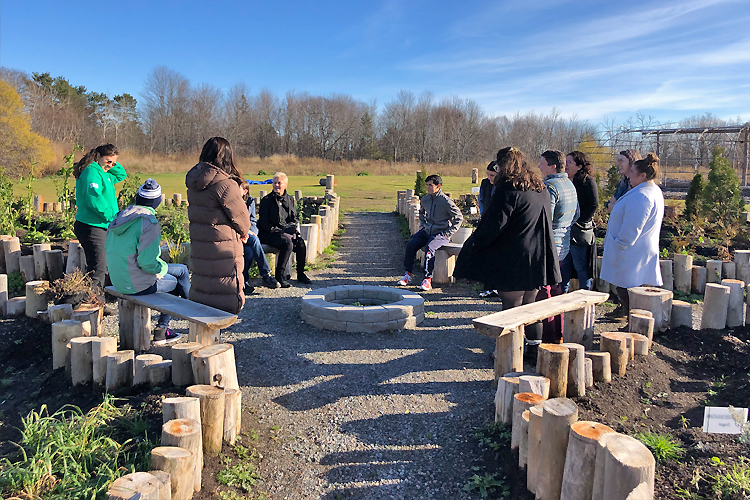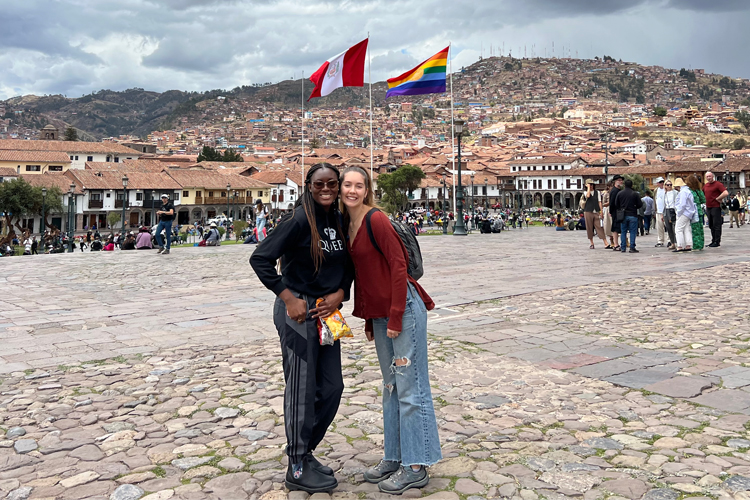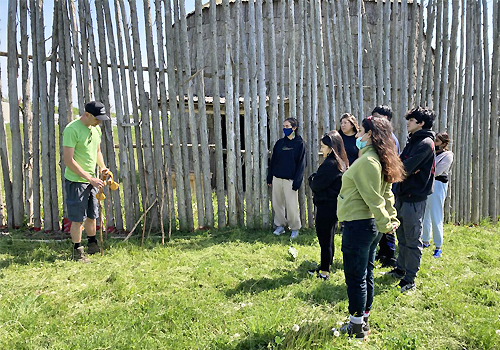
Learn about Indigenous Peoples, Spaces, Cultures, Languages and Histories
Indigenous Course Modules provide you with an opportunity to participate in an Indigenous related trip, deepening your understanding of Indigenous peoples, knowledges, histories, cultures, languages and the impacts of colonization. The trips may take place locally or internationally, typically over a weekend or Reading Week. The Faculty of Arts & Science covers travel and living expenses for both students and faculty members.
International and Indigenous Course Modules have been separated into two distinct programs. Click here for information about International Course Modules.
Benefits of Indigenous Course Modules
By participating in an Indigenous Course Module, you can:
- Develop your understanding of Indigenous histories, cultures and experiences
- Enhance your learning of academic concepts and ideas through Indigenous perspectives and worldviews
- Engage with Indigenous partners and reflect on where you come from and how you can work with and relate to Indigenous peoples and communities
Who is Eligible to Participate?
Courses with Indigenous Course Modules are open to students in any year. To be eligible, you must be:
- A full-time student in the Faculty of Arts & Science — St. George campus (exchange or non-degree students are not eligible to receive funding)
- In good academic standing
- Enrolled in the course that offers the Indigenous Course Module
Is There an Additional Cost?
Indigenous Course Modules are covered through your regular tuition fees. Depending on the duration and cost of the field experience, students may be required to contribute up to $200 to participate.
Courses with Indigenous Course Modules
| Course | Description | Instructor | Location | Travel Period |
|---|---|---|---|---|
|
ANT100: Introduction to Anthropology ANT364: Advocating Environmental & Climate Justice ANT484: Human Rights & Global Indigeneity ANT6100: History of Anthropological Thought |
Anthropology students in the select courses are invited to apply to participate in a two-day educational session at Akinomaagaye Lodge, located at Mississaugas of the Credit First Nation, during fall reading week. The session will be run by Giidaakunadaad/Nancy Rowe. Giidaakunadaad (The Spirit who lives in high places), Nancy Rowe is Michizaagiig, Ojibwe of the Anishinaabek Nation, located at New Credit First Nation. She is a recognized Knowledge Keeper and Representative of Mississaugas of the Credit FN. The lodge is located at 674 New Credit Road, Hagersville Ontario. More on the lodge is available here. |
Bonnie McElhinny, Katherine Patton, Omer Ozcan |
Akinomaagaye Lodge, Mississaugas of the Credit First Nation |
Two days during Fall 2025 Reading Week |
| HMB226: Indigenous Holistic Health | What is holistic health in an Indigenous framework? How can Indigenous practices and philosophies of holistic health (physical, mental, emotional, spiritual) be ethically explored to inform mainstream/colonial health care and healing? What is cultural safety in health care systems? This course explores the effects of traditional practices, culture, activities, arts, land-based healing, music and ceremony in health and healing. A three-day required field trip to the Indigenous community of Six Nations will include experiential, land-based learning, community-directed service learning and cultural teachings. | Melanie Jeffrey | Six Nations Reserve, Ontario | Three days in May/June 2026 |
|
LAS350: Indigenous Realities in Latin America |
This course focuses on the realities of the diverse Indigenous societies particular to the regions we now call Latin America. As a global classroom, the course will allow all students to directly connect and actively engage with Indigenous knowledge holders and peer student groups from an Indigenous community in Peru through 12 weeks of synchronous online sessions. The ICM will provide a select group of 8 students with the opportunity to travel to the same community and engage in activities with peers and community members to learn more about the community’s language, culture, history, politics, and economy through hands-on experiences. |
Victor Rivas, Paula Karger | Cusco and Pomacanchi, Peru | Fall 2025 Reading Week |
| LIN303: Introduction to Indigenous Languages of the Americas | In this course, students will participate in a cultural and linguistic exchange in Kaqchikel with local universities and NGOs, e.g., Kaqchikel University, Wuqu’ Kawoq/Mayan Health Alliance, Guatemala. Based on interviews and elicitations in Kaqchikel, students will develop a short report either on the documentation and revitalization of Mayan languages in Guatemala or on a grammatical feature of Kaqchikel. In addition to working on their research, students will participate in a two-day intensive course in Kaqchikel, an immersion program for the revitalization of Mayan languages in Guatemala by increasing knowledge of the language among community members. | Pedro Mateo Pedro | Patzun, Guatemala | Fall 2025 Reading Week |
| Course | Instructor | Location |
|---|---|---|
| ANT4010: Archaeology in Contemporary Society | Alicia Hawkins | M'Chigeeng, Ontario |
| SMC185H: SMC One: The Christianity, Truth and Reconciliation Seminar | Reid Locklin | Sault Ste. Marie |
Dates and Application Process
Students accepted for the Indigenous Course Modules are required to attend an orientation session. If you are travelling outside of Canada, you will need to do the following before the trip:
- Complete Safety Abroad requirements
- Prepare travel documents as required, well in advance. You are responsible for ensuring to you have valid travel documents, such as a passport and visa, to enter and exit the destination. The costs associated with travel document applications are not funded by the university. Contact Professional and International Programs, Woodsworth College (pip.international@utoronto.ca) if you need a supporting document for your travel document application.
- Complete immunizations and travel documents as required. Check whether there are required and recommended vaccinations on the Government of Canada Travel Vaccinations page. You should also check with a health care provider as soon as possible regarding vaccinations or other health concerns. Vaccinations are not funded by the university.
Refer to the list of Indigenous Course Modules above and enrol in the courses before the deadline to enrol in courses.
In some courses, there might be an additional application to participate in the course module. The course instructor will share those details in the class.
Priority will be given to students who previously have not received funding from the following A&S experiential learning programs: International Course Modules, Indigenous Course Modules or the Research Excursions Program.
If you require accommodations, please contact Accessibility Services and the Experiential Learning and Outreach Support office (experiential.artsci@utoronto.ca) well in advance of the trip to identify and develop any necessary accommodations.
Participation in Indigenous Course Modules should not impact your progress or ability to meet deadlines in other courses.
Please contact the Office of Experiential Learning and Outreach Support (experiential.artsci@utoronto.ca) if you have any questions.
Indigenous Course Modules in the News

As part of the St. Michael's College seminar course Christianity, Truth and Reconciliation, students had the opportunity to visit a former residential school in Sault Ste. Marie, Ontario. Throughout the trip, these students received archival training from staff, met with residential school survivors and engaged in a variety of activities that celebrate Indigenous culture and communities. Students described this experience as "one of the most reflective and insightful learning experiences ever."
Read more about their experience: 'A rare and deeply impactful experience': Students learn about residential schools and their legacy

Students from the Indigenous Realities in Latin America course travelled to the Peruvian town of Pomacanchi with Professor Victor Rivas. They learned about Indigenous farming, animal welfare, land conservation and daily life while living with the Indigenous community. “It was such an authentic experience,” first-year student Albert Xie says. “When I was there, I was really conscious of the earth that was sustaining me: thinking about what that earth means, what the animals mean, what the mountains mean to so many people.”
Read more about their experience: 'There’s no substitute for experiencing these ideas in person': A life-changing learning exchange for undergrads in the mountains of Peru.

Students in the Indigenous Holistic Health course taught by Melanie Jeffrey learned from Indigenous Elders and Traditional Knowledge Keepers. They explored the topics of plants as medicine, the connection of ceremony to mental health and the role of traditional practices and physical activity in wellness. The group went on a field trip to a cultural teaching and learning facility run by Six Nations of the Grand, called Chiefswoods Park, where the students deepened their understanding of Indigenous history, plant ecology, medicinal plants and agriculture. And the students learned to play historic traditional games including stickball.
Read more about their experience: Indigenous holistic health course a “transformative experience” for both students and instructor

